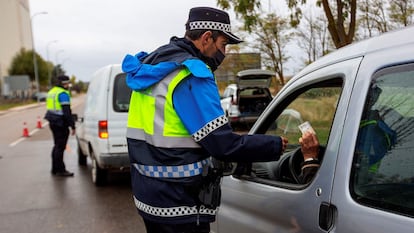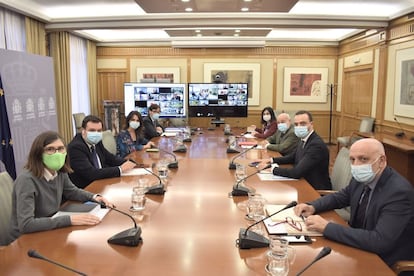Several Spanish regions to propose curfew as country battles coronavirus surge
Valencia, Castilla y León and Castilla-La Mancha are in favor of nighttime confinements, but Madrid’s position remains unclear

A day after coronavirus cases in Spain surged past the one million mark, central and regional health authorities were scheduled to meet on Thursday to discuss the next steps in the fight against the pandemic.
Several regional governments are now favoring overnight curfews, including those of Castilla y León, Castilla-La Mancha and the Valencia region. In the meantime some regions like Navarre are also closing their borders in a bid to contain the spread of the virus.
Valencia premier Ximo Puig is proposing a nighttime confinement of midnight to 5am until December 9. At a meeting with unions and the employer association CEV, Puig reportedly told them that if the measure is not adopted nationwide as hoped, it could still be introduced unilaterally in the Valencia region.
The spokesman for the government of Castilla y León, Francisco Igea, confirmed on Thursday that they will request a curfew as well. “We can’t let today go by; the time has come to make decisions, no matter how hard or drastic they may be.”

Igea added that if no consensus emerges from the meeting, the central government will have to accept its responsibility. “They need to take the necessary measures to preserve the lives of thousands of Spaniards, this cannot wait another day.”
One of the big unknowns of the meeting is what the Madrid region’s position will be. Its government, led by Isabel Díaz Ayuso of the Popular Party (PP), has been fighting the central government’s coronavirus measures, which included an imposed lockdown on the capital and several outlying cities that expires on Saturday.
In Castilla-La Mancha, the regional premier Emiliano García Page has asked for measures “at the national level.” If national guidelines are issued, the Canary Islands will ask to be excluded due to their more favorable epidemiological data.
The southern region of Andalusia has not expressed public support for a curfew, but on Thursday it introduced tougher restrictions on nighttime activities.
Even if a curfew is adopted at the national level, it is unclear what the time frame would be. Some regions support a 9pm start as in France, while others prefer midnight, which would still allow bars and restaurants to be open all day. The idea behind the curfew is to curb late-night partying following numerous instances of underground parties where large numbers of people congregate without social safety measures.
But the move comes with political and legal problems. The central government says that such a curfew requires the legal backing provided by a declaration of a state of alarm. Most regions agree with this, but it is unclear where the PP stands on this issue.
Regional sources consulted by this newspaper agreed that the measure should be extended for at least a month to be efficient at all, and to reduce transmission ahead of the Christmas holidays.
English version by Susana Urra.
Tu suscripción se está usando en otro dispositivo
¿Quieres añadir otro usuario a tu suscripción?
Si continúas leyendo en este dispositivo, no se podrá leer en el otro.
FlechaTu suscripción se está usando en otro dispositivo y solo puedes acceder a EL PAÍS desde un dispositivo a la vez.
Si quieres compartir tu cuenta, cambia tu suscripción a la modalidad Premium, así podrás añadir otro usuario. Cada uno accederá con su propia cuenta de email, lo que os permitirá personalizar vuestra experiencia en EL PAÍS.
¿Tienes una suscripción de empresa? Accede aquí para contratar más cuentas.
En el caso de no saber quién está usando tu cuenta, te recomendamos cambiar tu contraseña aquí.
Si decides continuar compartiendo tu cuenta, este mensaje se mostrará en tu dispositivo y en el de la otra persona que está usando tu cuenta de forma indefinida, afectando a tu experiencia de lectura. Puedes consultar aquí los términos y condiciones de la suscripción digital.








































